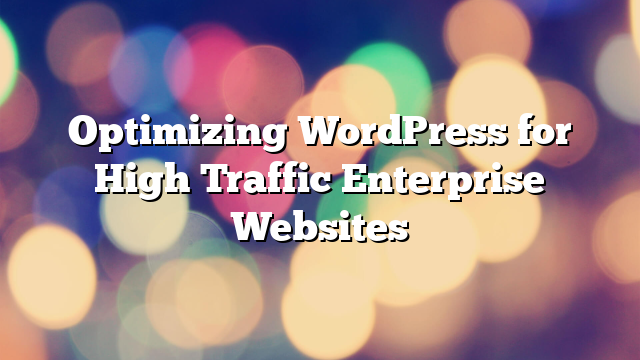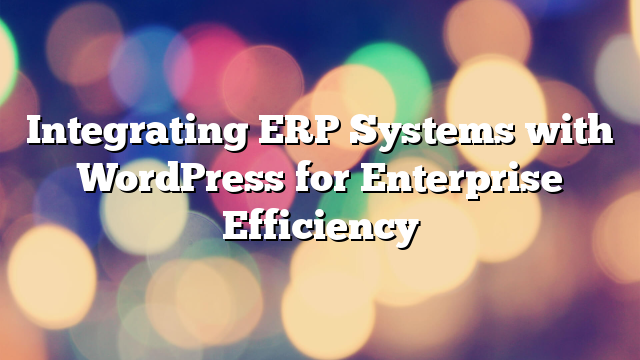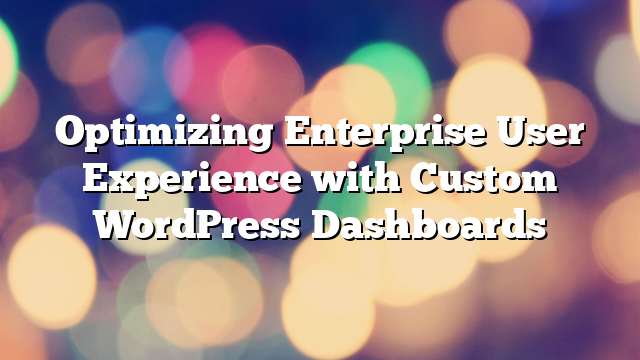Optimizing WordPress for High Traffic Enterprise Websites
23.10.2024

Enterprise websites must be equipped to handle high volumes of traffic without compromising on performance or user experience. WordPress, while flexible and powerful, requires specific optimizations to ensure it can scale and maintain fast load times under heavy loads. From server infrastructure to caching mechanisms, there are multiple factors to consider when optimizing WordPress for high-traffic enterprise environments. In this article, we’ll explore the best strategies for optimizing WordPress for enterprises that experience large spikes in traffic or consistently high visitor numbers.
Why High Traffic Optimization Matters for Enterprises
For enterprise websites, downtime or slow performance can lead to significant revenue losses, damaged brand reputation, and decreased customer satisfaction. A slow website can cause visitors to abandon pages, lowering conversion rates and affecting SEO rankings. Optimizing WordPress for high traffic ensures that enterprises can deliver a fast, reliable experience, even during peak times. It also helps websites handle surges in traffic during events like product launches, sales, or marketing campaigns.
Key Strategies for Optimizing WordPress for High Traffic
1. Choose a Scalable Hosting Solution
One of the most important factors for handling high traffic is choosing the right hosting solution. Enterprise-level websites require scalable hosting that can adjust to traffic surges without crashing. Managed WordPress hosting providers like WP Engine, Kinsta, or Cloudways are ideal for enterprises, as they offer optimized server configurations, automatic scaling, and built-in performance features.
Alternatively, enterprises can opt for cloud-based hosting services like AWS or Google Cloud Platform, which offer scalable infrastructure, allowing websites to add resources (CPU, RAM, storage) as needed to meet traffic demands. These platforms also provide advanced monitoring and security features, making them a popular choice for large-scale websites.
2. Implement Caching Solutions
Caching is one of the most effective ways to improve website performance and reduce server load. By storing static versions of your website, caching eliminates the need to reload dynamic content for every visitor. There are several types of caching that enterprises should implement:
- Page Caching: Stores static versions of entire pages to reduce the number of database queries and PHP executions.
- Object Caching: Caches database queries to avoid repeated requests for the same data.
- Browser Caching: Allows users’ browsers to store static files (CSS, JavaScript, images) locally, reducing load times for repeat visits.
WordPress plugins like W3 Total Cache, WP Rocket, and LiteSpeed Cache provide comprehensive caching solutions that can significantly speed up page load times. Additionally, managed hosting providers often have built-in caching mechanisms that are tailored for enterprise websites.
3. Use a Content Delivery Network (CDN)
A Content Delivery Network (CDN) helps distribute website content across multiple servers located in different geographic regions. CDNs reduce latency by serving content from the server closest to the visitor, resulting in faster load times, especially for global audiences.
CDNs are essential for enterprise websites that experience traffic from different locations around the world. By offloading bandwidth from the main server and distributing it across a network of servers, CDNs help reduce the load on your origin server and improve website performance.
Popular CDN providers include Cloudflare, StackPath, and KeyCDN. Many managed hosting providers also integrate CDNs into their offerings, making it easy to set up and manage.
4. Optimize Database Performance
As enterprise WordPress websites grow, the size and complexity of the database can become a bottleneck for performance. Regular database optimization helps ensure that queries are processed efficiently and that unnecessary data is removed. Key steps for optimizing the WordPress database include:
- Cleaning up post revisions, drafts, and spam comments: Over time, WordPress accumulates unnecessary data that can slow down queries. Plugins like WP-Optimize can help clean up this data and improve database performance.
- Using database optimization plugins: Tools like WP-DBManager or Optimize Database after Deleting Revisions allow enterprises to optimize tables and repair corrupt entries.
- Switching to a more powerful database solution: For high-traffic websites, switching from the default MySQL database to a more robust solution like MariaDB or PostgreSQL can improve performance and handle larger volumes of data.
5. Minimize HTTP Requests and File Sizes
Reducing the number of HTTP requests and optimizing file sizes is another key factor in improving page load times. HTTP requests are made every time a browser fetches a file from the server, such as CSS files, JavaScript files, or images. Minimizing these requests and optimizing file sizes can greatly enhance performance.
Steps to minimize HTTP requests and file sizes include:
- Combining and minifying CSS and JavaScript files: Tools like Autoptimize or WP Rocket can combine multiple files into a single request and remove unnecessary characters (whitespace, comments) to reduce file sizes.
- Lazy loading images: Lazy loading ensures that images are only loaded when they are visible on the screen, reducing the initial page load time.
- Optimizing images: Tools like Smush or ShortPixel can compress images without sacrificing quality, reducing the overall page size.
6. Use a Lightweight Theme and Plugins
Enterprise websites often require a high level of customization, but bloated themes and plugins can slow down performance. Using a lightweight, well-coded theme ensures that the website loads quickly without unnecessary features or scripts. Custom-built themes tailored specifically to your enterprise’s needs can eliminate the excess code that comes with multipurpose themes.
Similarly, enterprises should audit their plugins and remove any that are not essential. Each plugin adds extra code and functionality, which can increase load times. By limiting the number of plugins to only those necessary for business operations, enterprises can reduce the risk of performance issues.
7. Leverage PHP 8.0 or Higher
Upgrading to the latest version of PHP can provide significant performance improvements. PHP 8.0 and above offer faster processing times, better memory management, and new features that enhance security and speed.
Enterprise websites running on older versions of PHP, such as 7.x or lower, should consider upgrading to take advantage of these performance enhancements. Most managed WordPress hosting providers offer easy ways to switch between PHP versions without causing downtime.
8. Monitor and Analyze Website Performance
Continuous monitoring is essential for identifying performance bottlenecks and ensuring that your website remains optimized for high traffic. Performance monitoring tools like New Relic, Pingdom, or GTmetrix provide insights into server response times, page load times, and other key metrics.
By setting up alerts for performance issues, enterprises can address problems before they affect users. Regular performance audits should also be conducted to ensure that optimizations are still effective as the website grows and evolves.
Conclusion
Optimizing WordPress for high traffic is crucial for enterprises that need to maintain fast, reliable websites under heavy load. From selecting the right hosting infrastructure to implementing caching solutions and using a CDN, there are many ways to improve performance and scalability. By following these best practices, enterprises can ensure that their WordPress websites can handle large volumes of traffic without sacrificing user experience or website stability.
If your enterprise needs help optimizing its WordPress website for high traffic, contact AllWebDev for expert advice and custom solutions tailored to your business needs.



